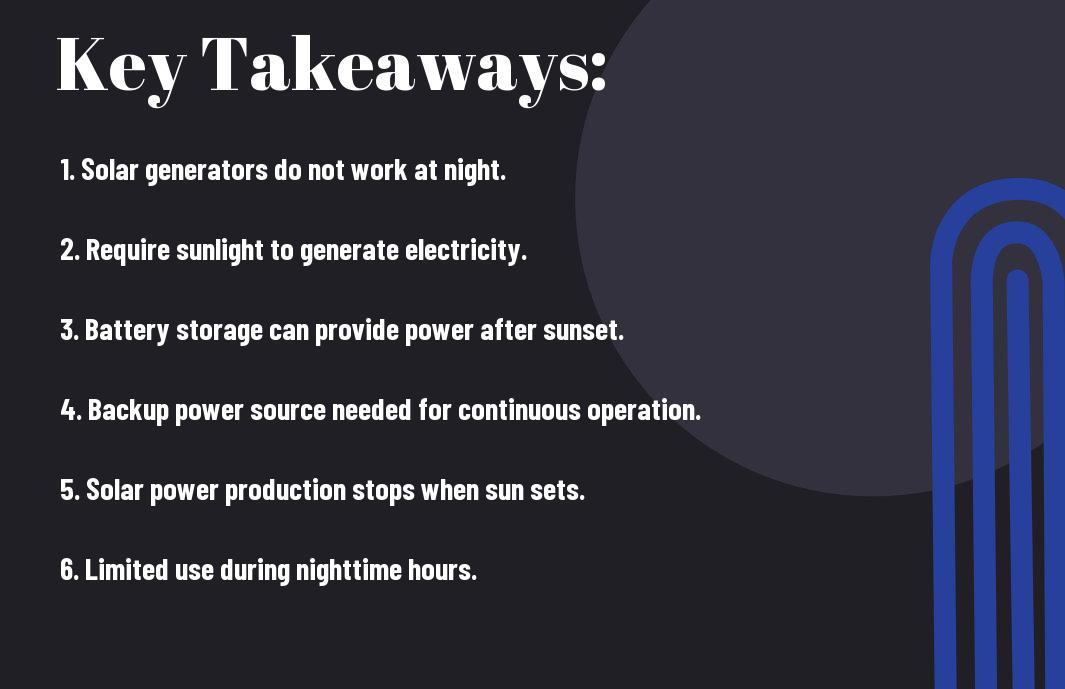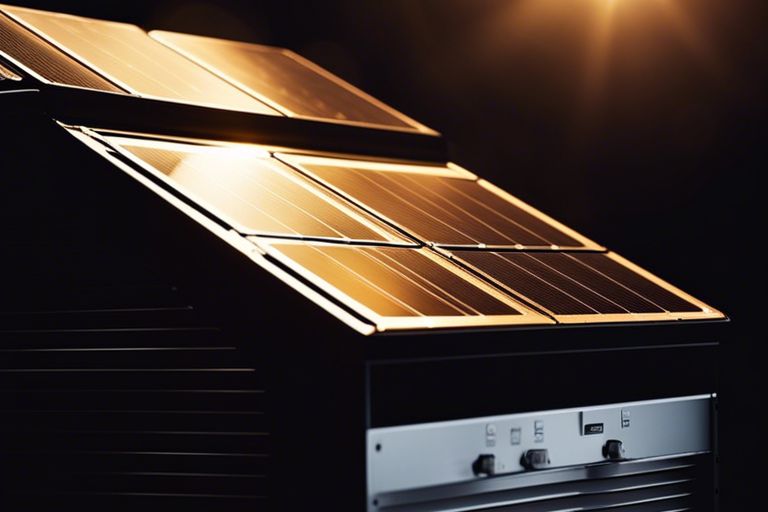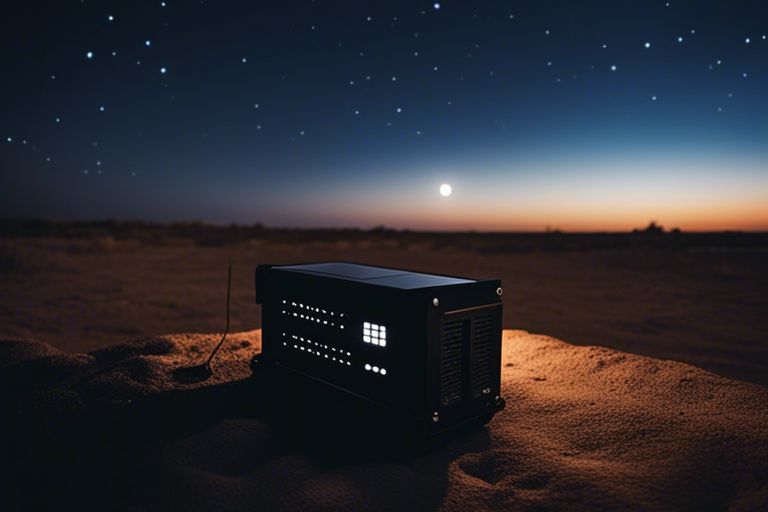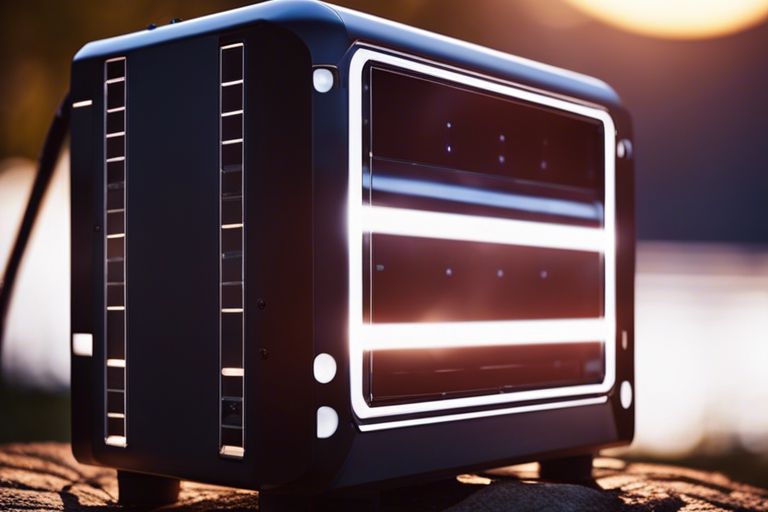Generators harness the power of sunlight to generate electricity, but do solar generators work at night? The answer is straightforward: solar generators depend on sunlight to produce electricity, so when night falls, the solar panels are unable to generate power. However, you can store excess energy in batteries during the day to use at night. By utilizing battery storage, you can ensure a continuous power supply even when the sun goes down. Do not forget, planning for night-time energy usage is key when relying on solar generators.
Key Takeaways:
- Solar generators cannot produce electricity at night: Solar panels require sunlight to generate power, so at night when there is no sun, they do not produce electricity.
- Battery storage is necessary: To have power available at night or on cloudy days, a solar generator needs a battery storage system to store excess energy generated during the day.
- Backup power may be required: If battery storage is insufficient, or during extended periods of low sunlight, a backup power source, such as a traditional generator, may be needed at night.
- Portable solar generators may have limited capacity: While convenient for outdoor activities, portable solar generators may not have the capacity to provide continuous power overnight without proper planning.
- Efficiency and location: Proper placement of solar panels, ensuring they receive maximum sunlight during the day, and using energy-efficient appliances can help optimize solar generator performance, even at night.
How Solar Generators Work
Harnessing Energy from the Sun
For solar generators to work, they need to harness energy from the sun. Solar panels, made of photovoltaic cells, are the key components responsible for capturing sunlight. These cells contain semiconductor materials that generate an electric current when exposed to sunlight. The panels are strategically placed to receive the maximum amount of sunlight throughout the day, ensuring optimal energy production.
Converting Sunlight into Electricity
Harnessing the power of the sun, the photovoltaic cells in the solar panels convert sunlight into electricity through the photovoltaic effect. This process involves the absorption of sunlight by the cells, which then creates an electric field across the layers of the material. This electric field causes electricity to flow, generating direct current (DC) electricity.
Converting sunlight into electricity is a sustainable and clean energy solution that reduces reliance on fossil fuels. The efficiency of this conversion process continues to improve with advancements in solar technology, making solar energy an increasingly viable option for powering homes and businesses.

The Limitations of Solar Generators
Clearly, solar generators are a great source of renewable energy during the day when the sun is shining. However, when night falls, and the sun sets, you might find yourself in need of alternative energy sources to power your devices and appliances. In situations like this, you may want to consider using backup generators or other power sources to meet your energy needs. If you’re curious to learn more about solar energy generation and its applications in various games, you can read more about it in a discussion on Solar in the day, generators at night :: 7 Days to Die ….
Daytime Energy Generation
One of the main advantages of solar generators is their ability to harness the sun’s energy during daylight hours. Solar panels convert sunlight into electricity, which can then be stored in batteries for later use. This stored energy can power your home or devices even when the sun is not shining, making solar generators a reliable source of renewable energy.
Nighttime Energy Needs
Energy requirement doesn’t diminish once the sun sets. Depending solely on solar generators may not be sufficient to meet your nighttime energy needs. During the night, when solar panels are not generating electricity, you may need to rely on alternative energy sources like batteries, backup generators, or grid power to ensure a continuous power supply for your devices and appliances.
A combination of solar generators with other energy sources can help you maintain a consistent power supply, ensuring you have electricity whenever you need it, day or night.

Do Solar Generators Work at Night?
The Short Answer
All solar generators rely on sunlight to generate electricity, so they do not work at night when there is no sunlight available. This is because solar panels require photons from the sun to create an electric current through the photovoltaic effect. Without sunlight, there is no source of energy to power the solar generator.
The Science Behind It
Solar generators function by converting sunlight into electricity through solar panels composed of photovoltaic cells. These cells absorb photons from sunlight, triggering an electron flow that generates an electric current. This current is then stored in a battery or used to power devices directly. As a result, solar generators are dependent on daylight to produce electricity.
It’s important to understand that the absence of sunlight at night means there is no energy production from solar panels. This limitation makes solar generators unsuitable as a sole power source for nighttime energy needs.
Another Consideration
While solar generators do not produce electricity at night, they can store excess energy generated during the day in batteries for later use. This stored energy can power your devices or home during the night when sunlight is not available. By utilizing battery storage, you can maximize the efficiency and effectiveness of your solar generator system.
Energy Storage Solutions
Batteries: The Key to Nighttime Power
Now, when it comes to powering your home with solar energy at night, energy storage solutions are key. Batteries play a vital role in this process by storing excess energy generated during the day for use when the sun goes down.
Charging and Discharging Cycles
Solutions such as lithium-ion batteries are commonly used in solar generator systems to store energy efficiently. These batteries go through charging and discharging cycles, where they are filled with energy from the solar panels during the day and then discharge that stored energy to power your home at night.
Batteries used in solar generators are designed to handle these cycles effectively, ensuring that you have a reliable source of power even when the sun is not shining. It’s important to choose high-quality batteries that can withstand frequent charging and discharging to maximize the efficiency of your solar generator system.

Inverter Technology
Keep Do Solar Panels Work At Night? in mind when considering how solar generators work at night. Inverter technology is a crucial component that enables solar generators to function after the sun goes down. An inverter converts the direct current (DC) electricity generated by solar panels into alternating current (AC) electricity, which is the type of power used in homes and businesses.
Converting DC to AC Power
One of the key roles of the inverter is to convert the DC power produced by solar panels into AC power that can be used to run your household appliances and devices. This conversion process is vital because most of the devices you rely on at night, such as lights, TVs, and electronics, operate on AC power. Inverters play a vital role in ensuring that the electricity generated by your solar panels is compatible with your home’s electrical system.
Efficient Energy Conversion
Energy efficiency is a critical aspect of inverter technology when it comes to solar generators working at night. Inverters are designed to maximize the efficiency of energy conversion from DC to AC power. This means that a higher percentage of the electricity produced by your solar panels is effectively converted into usable power for your home, minimizing energy waste and ensuring that you have a reliable source of electricity even when the sun isn’t shining.
A well-designed inverter can significantly impact the overall performance and reliability of your solar generator system. By efficiently converting DC electricity into AC power, the inverter ensures that you can continue to power your home using clean, renewable energy even when the stars are out.
Real-World Applications
Off-Grid Systems
The concept of solar generators working at night may seem perplexing, but the truth is they do not generate electricity when the sun goes down. Off-grid systems, which are not connected to the utility grid, typically rely on energy storage solutions like batteries to provide electricity during nighttime hours. These systems store excess energy generated during the day for use when the sun is not shining.
Grid-Tie Systems
For homes or businesses connected to the grid, solar generators work differently. Grid-tie systems are designed to feed excess electricity generated by the solar panels back into the grid. During the day, when your solar panels are producing more energy than you are using, the excess power is sent to the grid, and you receive credits for it. Then, at night or when your energy demand exceeds what your panels are producing, you can draw electricity from the grid.
With grid-tie systems, you can benefit from net metering policies, which allow you to save money on your electricity bill by offsetting the energy you draw from the grid with the excess energy your solar panels produce. This way, you can still reap the financial benefits of solar energy even when the sun is not out.
To wrap up
With this in mind, it is clear that solar generators do not work at night due to the absence of sunlight. During the night, the solar panels are not able to convert sunlight into electricity, which means that you will need to rely on stored energy or alternative power sources. It is important to have a backup plan in place for times when your solar generator is not able to generate electricity, such as using a battery storage system or a traditional generator.
Overall, while solar generators are a great renewable energy option during the day, they are not designed to function at night. Understanding the limitations of solar power can help you make informed decisions about your energy needs and ensure that you have reliable power sources available at all times.
FAQ
Q: Do solar generators work at night?
A: No, solar generators do not work at night. Solar panels rely on sunlight to convert it into electricity using photovoltaic cells. Without sunlight, there is no power generation.
Q: Can solar generators store energy for use at night?
A: Yes, some solar generators come with battery storage capabilities. During the day, excess electricity generated by the solar panels can be stored in these batteries for use at night or when sunlight is not available.
Q: Are there alternative energy sources for nighttime power generation?
A: Yes, there are alternative energy sources that can be used for nighttime power generation. These include wind turbines, hydroelectric power, geothermal energy, and battery storage systems that can be charged during the day from solar panels.
